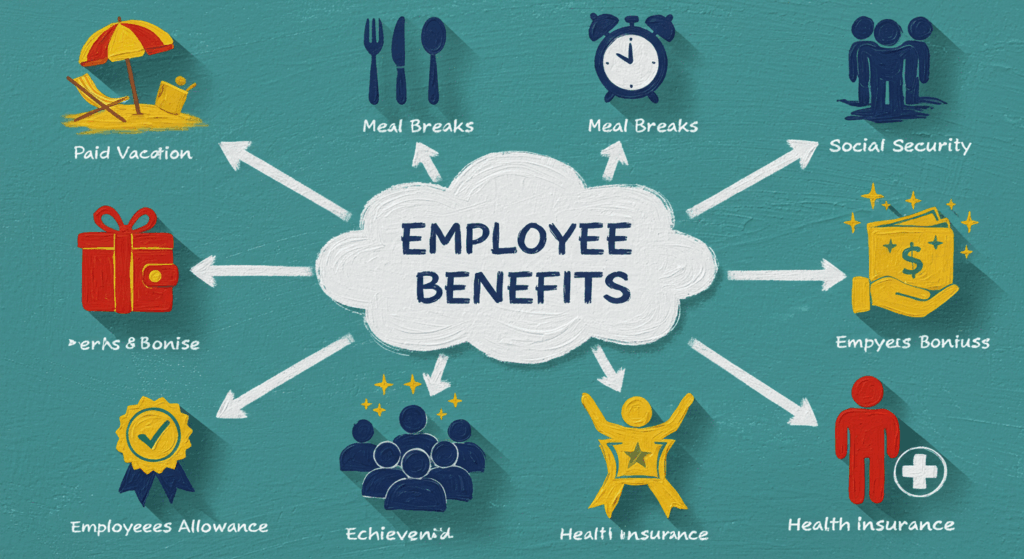You know that feeling when you’re lying awake at 2 AM, calculating whether you can afford groceries AND gas this week? Yeah, we’ve all been there. Money talk is awkward, uncomfortable, and honestly? Something most of us just wing it with, hoping for the best.
But here’s the thing – and I’m being totally honest here – avoiding these conversations is costing us. Big time. Whether it’s never asking for that raise, not knowing how to stretch a paycheck, or feeling like savings are some mythical concept reserved for people who don’t stress about their electric bill, we’re all just trying to figure it out as we go.
So let’s have that real conversation about money and work that nobody really prepares you for. No fancy financial jargon, no judgment, just straight talk about the stuff that keeps us up at night.
The Salary Conversation Nobody Wants to Have
Why We’re All Terrible at Talking Money
According to an April survey by banking app Chime, 54% of new grads said they find salary negotiation to be “more painful than breaking up with a partner.” And honestly? That tracks. At least with breakups, there are established scripts. With salary talks, you’re basically improvising your way through what might be the most important conversation for your financial future.
The weird thing is, we’re taught that talking about money is rude or inappropriate. But then we’re expected to magically know how to negotiate our worth in the workplace? It doesn’t make sense.
I remember my first real job interview – I was so focused on just getting hired that when they asked about salary expectations, I literally said “whatever’s fair.” Spoiler alert: that’s not how you maximize your earning potential. Live and learn, right?
Actually Asking for What You’re Worth
The truth is, most of us are probably underpaid and don’t even realize it. Companies aren’t going to volunteer to pay you more out of the goodness of their hearts. You should ask for a specific salary instead of giving a range, as it conveys confidence in your collaboration skills and shows that you did research.
But here’s what I wish someone had told me earlier: negotiation isn’t just about the base salary. Rather than zeroing in on salary, take time to think about the range of issues at stake, including benefits, role, and location. Sometimes you can get more vacation days, flexible work options, or professional development opportunities that are worth just as much as extra cash.
The key thing – and this took me years to figure out – is timing. If you’re looking to get a raise in 2025, bring it up as early in the year as is appropriate. Don’t wait until your annual review when budgets are already set. Have those conversations when there’s actually room to make changes.
Prep Work That Actually Matters
Before you march into your boss’s office demanding more money (please don’t actually do that), you need to do your homework. And I don’t mean just looking up salary ranges online, though that’s part of it.
Before you begin to negotiate salary, jot down concrete examples of how your skills and experience could benefit your new company’s bottom line. This isn’t about bragging – it’s about building a case. What projects did you lead? What money did you save the company? What problems did you solve?
Rehearse your negotiation points ahead of time. Outline your salary expectations, justify them with market data, and be prepared to discuss benefits beyond pay, like remote work or extra PTO. Practice with a friend if you have to. I know it feels awkward, but stumbling through your first salary negotiation is way more awkward.
When Every Dollar Counts: Living Paycheck to Paycheck
The Reality Check
Let’s be real – a huge chunk of us are living paycheck to paycheck, and it’s not because we’re all financial disasters. Sometimes life is just expensive, and wages haven’t kept up with the cost of literally everything.
There’s no breathing room and no savings, and you’re just surviving from one payday to the next. If that’s you right now, first of all, you’re not alone. Second, you’re not doomed to stay there forever, even though it might feel like it some days.
The thing about living paycheck to paycheck is that it’s not just about money – it’s about stress, anxiety, and that constant mental load of calculating every expense. It’s exhausting, and it makes it hard to think about long-term financial goals when you’re just trying to make it through the month.
Small Changes That Actually Add Up
When you’re stretched thin, the last thing you want to hear is some financial guru telling you to “just save more.” Like, thanks Captain Obvious, why didn’t I think of that? But there are some genuinely helpful strategies that don’t require you to suddenly double your income overnight.
Regularly reviewing your spending and identifying essential versus non-essential expenses is crucial for freeing up money to save. I know, I know – budgeting is about as fun as getting a root canal. But it doesn’t have to be this elaborate spreadsheet situation. Just knowing where your money goes is half the battle.
Start with subscriptions. Seriously, when’s the last time you used that gym membership? Or that streaming service you signed up for during that one show’s season and then forgot about? Those $10-15 monthly charges add up faster than you’d think.
The Emergency Fund Reality
Every financial expert will tell you that you need an emergency fund. And they’re right, but they’re also kind of missing the point when you can barely afford emergencies as they happen, let alone save for future ones.
An emergency fund may help prevent short-term setbacks from becoming long-term financial struggles. The goal isn’t to suddenly have six months of expenses saved up – that’s overwhelming when you’re starting from zero. Start with $100. Then $500. Even having a small buffer can prevent that domino effect where one unexpected expense throws off your entire month.
Here’s what worked for me: I started putting aside whatever change I had at the end of each day. Literally coins and crumpled dollar bills in a jar. It’s not sophisticated, but it’s something. Some weeks it was $3, some weeks it was $20. But it added up, and more importantly, it got me in the habit of thinking about saving.
Making Your Money Work (Even When There’s Not Much of It)
Budgeting Without the Overwhelm
You can break the paycheck-to-paycheck cycle by getting on a budget, taking care of your Four Walls first, cutting extra expenses, building an emergency fund, and increasing your income. The “Four Walls” thing is actually pretty smart – it’s housing, utilities, food, and transportation. Everything else comes after you’ve covered those basics.
But let’s talk about budgeting methods that don’t require a finance degree to understand. Using tailored budgeting methods like zero-based budgeting or “pay yourself first” can make your savings goals more achievable.
Pay yourself first is exactly what it sounds like – before you pay bills, before you buy groceries, you put something aside for savings. Even if it’s $25. The idea is that if you wait until the end of the month to save whatever’s left over, there probably won’t be anything left over.
The Side Hustle Reality
Everyone talks about side hustles like they’re the magic solution to money problems. And sure, extra income can definitely help, but let’s be realistic about what that actually looks like.
If you believe you’re worth more than what you’re currently making, ask for a meeting with your boss and make your case. Before you start driving for rideshare companies or selling stuff online, see if you can increase your main source of income first. It’s usually easier to negotiate a $2,000 raise than to make an extra $2,000 a year from side work.
That said, if side income is your route, think about what you’re already good at. Can you tutor? Do freelance work in your field? Pet sit? House sit? The best side hustles are ones that don’t feel like you’re working a second full-time job.
Saving Strategies That Don’t Suck
Many experts recommend saving between 10% and 15% of your income each year for retirement. Which is great advice if you’re making enough money that 10-15% doesn’t mean choosing between saving and eating. For everyone else, start smaller and work your way up.
The 52-week challenge is one of those things that sounds gimmicky but actually works. Week 1, you save $1. Week 2, you save $2. By the end of the year, you’ve saved over $1,300. Or you can do it in reverse – start with the bigger amounts when you’re motivated and work down to smaller amounts as the year goes on.
Automatic transfers are your friend. Set up even a tiny automatic transfer – $25 or $50 – to a savings account right after payday. You’ll adjust to living without it pretty quickly, and it removes the decision-making part of saving.
The Real Talk About Money Stress
It’s Not Just About the Numbers
Money stress is real stress. It affects your sleep, your relationships, your health, your job performance. And there’s this weird shame around admitting that you’re struggling financially, like it’s somehow a personal failing rather than a reflection of larger economic realities.
The mental load of constantly calculating whether you can afford things is exhausting. Can I get the name-brand cereal this week? Should I put gas in my car or wait until tomorrow when I get paid? These aren’t decisions anyone should have to make regularly, but a lot of us do.
These tips can help you get out of the two-week money squeeze. Sometimes it’s not about finding some revolutionary financial strategy – it’s about finding ways to reduce the stress while you’re working on the bigger picture.
Building Better Money Habits
The thing about money habits is that they’re just habits. You can change them, but it takes time and it takes being gentle with yourself when you slip up. Nobody goes from financial chaos to perfect money management overnight.
Start with one small thing. Maybe it’s checking your bank balance every morning. Maybe it’s writing down every purchase for a week just to see where your money goes. Maybe it’s having a honest conversation with your partner about money goals and fears.
You’ll work only with the money you actually have. This will finally give you clarity into what your money needs to do before you get. There’s something incredibly freeing about knowing exactly what you’re working with instead of hoping there’s enough money in your account to cover that purchase.
When to Ask for Help
There’s no shame in admitting that you need help with money stuff. Whether that’s talking to a financial counselor, using budgeting apps, or just having honest conversations with friends and family about money challenges.
Credit counseling services can help if debt is part of your money stress. Many are free and can help you understand your options without trying to sell you anything. Sometimes just having someone explain what’s happening with your finances in plain English can make a huge difference.
Looking Forward: Building Something Sustainable
The Long Game
Here’s what I wish someone had told me when I was younger: personal finance isn’t about perfection, it’s about making slightly better decisions over time. You don’t need to suddenly become someone who clips coupons and tracks every penny (unless that works for you).
The goal is building a system that works for your actual life, not the life you think you should have. Maybe that means paying bills automatically so you don’t forget. Maybe it means using cash for discretionary spending so you can physically see what you’re spending. Maybe it means having separate savings accounts for different goals.
Career Growth and Money Growth
With inflation, shifts in remote work, AI-driven job markets, and an increased emphasis on pay transparency, candidates must be more informed and strategic than ever when negotiating their salaries. The job market is changing, and staying informed about industry trends and salary ranges in your field isn’t just helpful – it’s necessary.
Investing in yourself through skills development, networking, or additional certifications might seem expensive when money is tight, but it’s often the best investment you can make for your long-term earning potential.
The Bottom Line (Pun Intended)
Money and work conversations are uncomfortable because they matter so much. Your salary affects every part of your life – where you can live, what you can do, how much stress you carry around, what your future looks like.
But avoiding these conversations doesn’t make them go away. It just means you’re operating with less information and fewer options than you could have.
Whether you’re trying to negotiate a better salary, break the paycheck-to-paycheck cycle, or just figure out how to save a few dollars each month, remember that everyone is making it up as they go along to some extent. The people who seem to have it all figured out? They probably started exactly where you are right now.
The most important thing is to start somewhere. Have that salary conversation. Look at your spending. Put $20 in a savings account. Ask for help when you need it. Small steps in the right direction are still steps in the right direction.
And hey, at least you’re thinking about this stuff, which puts you ahead of a lot of people who just hope everything will work out somehow. You’ve got this – even when it doesn’t feel like it.









